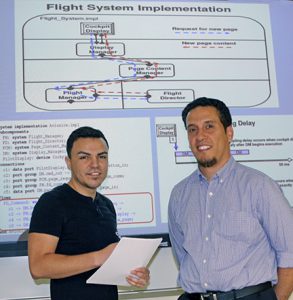By Daniel Perez
UTEP News Service
From an early age, Rebekah Gruver was the kind of child who liked to take things apart to see how they worked. Her tinkering was nurtured by family members who were educators and engineers.
She was accepted into the engineering magnet program at El Paso’s Chapin High School and gravitated toward computer science. Her interest only intensified at The University of Texas at El Paso, where the junior has done research on high performance computers and interned at AT&T.

Gruver experienced one of those “aha” moments after Salamah I. Salamah, Ph.D., clinical associate professor and director of UTEP’s Software Engineering Program, spoke to her class about the University’s plan to offer a Master of Science in software engineering.
He explained there is a growing need for software engineers proficient in mission and safety critical systems in fields such as defense, finance, health care, power grids, transportation, communication, disaster response and weather forecasting.
“This new degree will open so many more opportunities,” said Gruver, who wants to oversee the development process as a project manager. “I think the sky is the limit.”
The U.S. Bureau of Labor Statistics projects a 30 percent increase in demand for software engineers by 2018 in the areas of application and system software, which translates to almost 300,000 new jobs. The continued complexity in the field is expected to lead to additional growth.
“There is a tremendous demand for software engineers in industry and government,” said Richard Schoephoerster, Ph.D., dean of UTEP’s College of Engineering. “This program has been designed by those constituent partners and we’re prepared to fill this need.”
The Texas Higher Education Coordinating Board (THECB) approved the University’s 76th master’s degree – the 14th through the College of Engineering – in late April. The degree approval process started in 2010 after the college received a grant from the U.S. Department of Education Fund for Improvement of Postsecondary Education program and the National Science Foundation Science Master’s Program. It received assistance from industry stakeholders, especially key leaders from Lockheed Martin, in developing the degree plan’s strategy and course content.
The program will be part of the Department of Computer Science under the direction of Salamah, who earned his Ph.D. in computer science from UTEP in 2007. He taught computer science and software engineering at Embry-Riddle Aeronautical University in Daytona Beach, Fla., before returning to UTEP in January 2013 to direct its software engineering program.
Salamah said that there are only 21 accredited software engineering programs in the country – none of which is at the graduate level – and the supply of those graduates cannot keep up with the demand. He said he already is being contacted by industry and students, some from as far away as India, about the intense, 30-hour program that students can complete in an academic year.
He expects the program to begin with approximately 20 students in the fall, but stressed that while most will come with an engineering background, the group could have some non-engineering majors – and they are welcome to apply. Leveling courses will be offered to help non-engineering students become more comfortable with the subject.
“We want students from all backgrounds so they can learn from each other,” Salamah said. “That’s the beauty of software engineering. It’s more than writing code. It’s about dealing with customers and learning what they want and what they need. There’s a place for everybody at the table.”
In anticipation of the program’s approval, Javier Garza started his graduate studies in August 2012 after earning his bachelor’s in computer science from UTEP the previous May. He began to take a special online curriculum in spring 2013 after he accepted a job as a software engineer associate with Lockheed Martin in Houston. Among his professional assignments was to design and implement NASA systems and applications for Mission Control Center software that will enhance spaceflight.
“I was in shock when I found out I’d be the program’s first graduate,” said the El Paso native who will participate in the May 17 Centennial Commencement ceremony in the Sun Bowl Stadium.
Joshua Grajeda called the new degree program a dream come true. He expects to enroll in the program after he earns his bachelor’s degree in computer science in December 2014.
Grajeda said he has been interested in technology since he was 7 years old, and that his father, a technician with a large El Paso school district, made sure his son always had access to the latest software. The student has juggled his schoolwork with part-time jobs and internships with the El Paso Independent School District and ExxonMobil that have fueled his software interest. He is spending his summer in Seattle as an information technology analyst with Boeing.
Excited about the new software degree, Grajeda knows it will make him more valuable and more marketable.
“I get to stay home for graduate school,” the El Paso native joked.